
THE VOICE OF INTERNATIONAL LITHUANIA
|
VilNews has its own Google archive! Type a word in the above search box to find any article.
You can also follow us on Facebook. We have two different pages. Click to open and join.
|
Author Archive
- Posted by - (10) Comment
Can good come
from selfishness?

During a trip to Lithuania a few years ago, Boris went to the North Lithuanian city of Siauliai to see his grandmother’s sister before she died. At 97 she was the oldest surviving member of his family.
By Boris Vytautas Bakunas
I want to tell you a true story. During a trip to Lithuania a few years ago, I drove to the city of Siauliai to see my grandmother’s sister before she died. At 97 she was the oldest surviving member of my family.
My reason for visiting her was not only selfish, but it was based on an illusion. By meeting her, I believed that I could reconnect in some mysterious way with my grandmother whom I had loved very much. My motive was selfish because I visited the old woman so I could feel good. I did it for me, not for her.
I didn’t really expect any reaction greater than customary courtesy and perhaps even mild interest. Was I surprised!
When I entered the small cottage where she lived with her daughter and her son-in-law, I saw a table decked with delicacies, juice, brandy, and beer. A bright red candle had been lit in my honor. The room was so small that we had to huddle closely together around the table. My great aunt and my cousin sat beside me.
I quickly sensed that age had taken a toll on her faculties. “How nice it is to see you again,” she kept saying over and over as if I had just walked through the door.
As I looked at her worn, wrinkled face, battered by years of hard living, I saw a gleam in her eyes that beckoned back to the beautiful young girl she had once been. Her eyes shone like drops of morning dew after a cold night. All the while I was there, she kept looking gently at my face. Her soft sliver of a smile threw gentleness and love my way. I thought of an aged Mona Lisa.
After my cousin and her husband went into the garden, my cousin asked, “Do you know why my mother kept staring at you like that?”
“No, tell me,” I said.
“She thinks that you are her son, and you’ve just returned home from a trip.”
Her son had died years ago.
Was I disappointed? Did I feel bad that I had come too late for my great aunt to recognize me, or even remember that I existed?
Not at all! Instead my heart surged with amazement at this mysterious life we lead. I had made this journey out of selfishness – to satisfy my own desire. I wanted this meeting for myself, not for her.
But my selfishness, born out of the illusion that I could once again feel the glow of my grandmother’s love, had created joy in the heart of another human being, a joy also born out of the illusion that I was her long lost son.
I did see my grandmother’s love once again. I saw it in her aged sister’s eyes. And she saw her son.
Even out of illusion and selfishness good can come. What a mysterious existence we live!
- Bookmark :
- Digg
- del.icio.us
- Stumbleupon
- Redit it
- Posted by - (0) Comment
LITHUANIA’S BEST RESTAURANTS
TripAdvisor chooses Druskos Namai
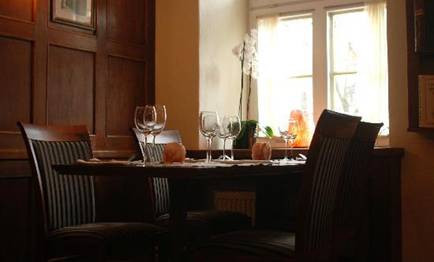
TripAdvisor.com has selected Lithuania’s best restaurants.
Druskos Namai in Užupis, Vilnius, tops the list!
TripAdvisor is a travel website that assists customers in gathering travel information, posting reviews and opinions of travel related content and engaging in interactive travel forums. TripAdvisor was an early adopter of user-generated content. The website services are free to users, who provide most of the content, and the website is supported by an advertising business model.
THE DRUSKOS NAMAI PHILOSOPHY
We prepare our food in accordance with the principles of modern European cuisine using the best quality Lithuanian products.Preference is given to products supplied by farms located close to Vilnius. Menu changes often - dishes of depends on what kind of fresh produce on a daily basis we receive from manufacturers and what's available at the time of the year.
- Bookmark :
- Digg
- del.icio.us
- Stumbleupon
- Redit it
- Posted by - (0) Comment
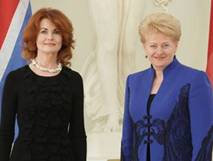
Lithuanian President Dalia
Grybauskaitė with Iceland’s
Ambassador Elin Flygenring.
How can Lithuania
learn from Iceland?
The Icelandic government failed to convince its own citizens in the elections this weekend, and the conservative opposition claimed poll win as voters returned parties that ruled over 2008 financial collapse back to power.
But the present Icelandic government has, nevertheless, something important to teach the eurozone, according to an Icelandic economics professor.
While droves of businesses have had to close its doors in Euro cities like Rome and Athens, the business community in Reykjavik avoided mass death. But it could have gone differently, says economics professor Thórólfur Matthíasson at the University of Iceland.
Read more...
Response from
Eythor Edvardsson
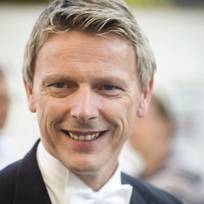
Eythor Edvardsson Well, the fact is that we read more in foreign media about the success and progress of the leaving government than in the Icelandic ones. Government failed to protect the homes from the collapse, home loans have increased 40-50% since 2008 which has in many cases exceeded home values. People who owned f.o.e. 50% equity before crisis have nothing now. But the ones who had savings in banks, government protected.
Elections now were won mainly by the party who made a promise to correct the home loan situation. Whether they will manage or not will be interesting to see but they are mainly looking towards finding the money to do so by taxing the funds and investors who took over the fallen banks in Iceland who already are making billions ISK profit.
Government who fell 2008 was blamed for collapse, crisis and whatever went wrong. However, after a research and being taken to court as PM of that government had to face, nothing came out of it and he only guilty of not informing his fellow ministers good enough in the roughest times.
Our welfare party who claims they did great in the last four years got 56.000 votes in election 2009. Now, they got 26.000 votes. Tells alot about how the people see the great work the world believes they did...
learn from Iceland
is hard to see
Eythor Edvardsson What Lithuania can learn from it is hard to see. Iceland has its own currency that lost a great value helping our export greatly. Iceland's economy stands on several pollars. Fish industry, Energy industry, great hugely growing tourism, agriculture, IT etc.
Our population with only 320. 000 people ( with Lithuanians as our third nation in Iceland) gives flexibility.
I believe that Lithuania did great already in the recession with the "Inner devaluation". With a currency pegged to the EURO, it's hands were tightened. But with dealing with the situation by "tightening the belt by two holes" for the Lithuanian nation, they will
come out of the crisis stronger. Until, the LT economy might not be so "sexy" but will make the country more attractive for investors around the world.
LT should use these times and emphasise on increasing the quality of education in LT. After all, LT does have two times more of people with higher education than the average European country does.
Education and Culture are the key words for LT from my point of view into the future.
- Bookmark :
- Digg
- del.icio.us
- Stumbleupon
- Redit it
- Posted by - (0) Comment
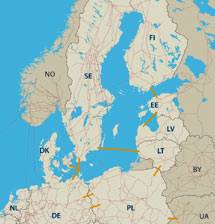
Increased import of electricity from the Nordic countries
The newsletter Energy Update, published by the Lithuanian transmission system operator Litgrid, summarizes the latest developments in the Lithuanian electricity sector.
In this issue:
- Good results in 2012 for Litgrid;
- Contractors selected for the reconstruction of the Alytus switchyard and the construction of the LitPol Link overhead line;
- Government allows laying a cable for the NordBalt electricity connection in the coastal zone;
- Liudas Liutkevičius: Electricity market – the active gain and the passive lose;
- In a few years, a new electricity transmission line will connect Kretinga and Benaičiai;
- Bigger import of electricity from the Nordic countries;
Please find attached the newsletter Energy Update.
- Bookmark :
- Digg
- del.icio.us
- Stumbleupon
- Redit it
- Posted by - (0) Comment
King of Lithuania?
Prince Inigo von Urach is ready!
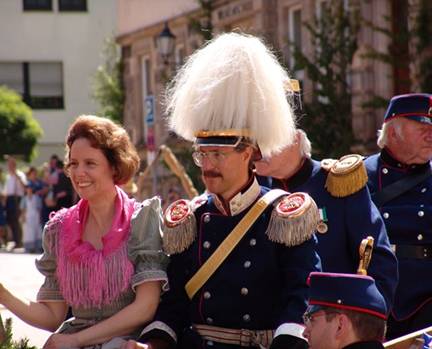
Prince Inigo of Urach, born 12 April 1962, with his wife –
Daniela Freiin von und zu Bodman, born 28 August 1963.
By Liudvikas Jakavičius-Grimalauskas
I am monarchist and I love to write about monarchy and nobility. I know that monarchy is not a topic that all people like, and that lot of people don’t want that monarchy returns to Lithuania. Personally, I think monarchy is the best form of government. If you research, 95% of the world monarchies are developed countries. But I respect all points of view, and also I can said that even if I prefer a monarchy to a republic, I am very satisfied with the work that our politicians have done, and I am very satisfied with the direction of our country. But, why do I think that this topic can be interesting for all Lithuanians? Because whether you like monarchy or not, this is part of our history, and Lithuanians like culture. So some people will like my points of views, and Prince Inigo von Urach views, and some will not. But the historical side of the article should be interesting for the majority of Lithuanians, whether they like monarchy or not.
Today Lithuania is a modern and dynamic North European nation of high technologies and innovations, with the second fastest growing economy in the European Union. But the territory that belongs to Lithuania has a large and old tradition as a Monarchy, tracing its political origins to 1219 as an independent Grand Duchy (The Grand Duchy of Lithuania), created by Mindaugas, a warrior who unified the territories that he conquered, proclaiming himself Grand Duke of Lithuania.
- Bookmark :
- Digg
- del.icio.us
- Stumbleupon
- Redit it
- Posted by - (6) Comment
King of Lithuania?
Prince Inigo von Urach is ready!

Prince Inigo of Urach, born 12 April 1962, with his wife –
Daniela Freiin von und zu Bodman, born 28 August 1963.
By Liudvikas Jakavičius-Grimalauskas
I am monarchist and I love to write about monarchy and nobility. I know that monarchy is not a topic that all people like, and that lot of people don’t want that monarchy returns to Lithuania. Personally, I think monarchy is the best form of government. If you research, 95% of the world monarchies are developed countries. But I respect all points of view, and also I can said that even if I prefer a monarchy to a republic, I am very satisfied with the work that our politicians have done, and I am very satisfied with the direction of our country. But, why do I think that this topic can be interesting for all Lithuanians? Because whether you like monarchy or not, this is part of our history, and Lithuanians like culture. So some people will like my points of views, and Prince Inigo von Urach views, and some will not. But the historical side of the article should be interesting for the majority of Lithuanians, whether they like monarchy or not.
Today Lithuania is a modern and dynamic North European nation of high technologies and innovations, with the second fastest growing economy in the European Union. But the territory that belongs to Lithuania has a large and old tradition as a Monarchy, tracing its political origins to 1219 as an independent Grand Duchy (The Grand Duchy of Lithuania), created by Mindaugas, a warrior who unified the territories that he conquered, proclaiming himself Grand Duke of Lithuania.
On July 6, 1253 Mindaugas was officially crowned as King of Lithuania by Pope Innocent IV. With his coronation was born the first Kingdom of Lithuania, giving rise to the state of Lithuania. When Mindaugas was killed by his nephew Trenoita, his nephew abolished the Kingdom and restored the Grand Duchy of Lithuania, which lasted until 1795, when Catherine “the Great” conquered Lithuania, and the Grand Duchy became part of the Russian Empire.
The peak in the history of Lithuania was the reign of Vytautas "the Great" between 1392 and 1430. The Lithuanian Empire during his reign covered more than a million square kilometers, and was one of the most powerful nations in Europe. Led by Vytautas "the Great" Lithuanians and their allies (Poland) destroyed the power of the Teutonic Order (Germany) in 1410 during the Battle of Grünwald.
The Battle of Grünwald was one of the largest battles in Medieval Europe and is regarded as the most important victory in the history of Lithuania.
The period 1569 - 1795 was the decline of Lithuania during their official union with Poland. In
1795, Lithuania was occupied by the Russians for the first time and Russians tried to exterminate
Lithuanian culture
Fortunately, Russians failed in their attempt to destroy Lithuanian culture, thanks to the work of many Lithuanian patriots. One prove of that is Lithuanian language that is one of only two living languages (together with Latvian) in the Baltic branch of the Indo – European language family. Lithuanian language is one of the world’s oldest languages and is believed to be the most conservative living Indo – European language, retaining many features of Proto – Indo – European now lost in other Indo – European languages. It's really amazing how our ancestors managed to preserve our language so pure, despite Russian oppressions.
The end of the eighteenth century was a period of revolutions that ended at the beginning of the nineteenth century destroying many monarchies. The majority of the revolting nations replaced their thrones with communist governments.
|
On February 16, 1918 Lithuania declared its independence from the Russian Empire. On June 4, 1918 the Council of Lithuania voted to invite HSH Prince Wilhelm von Urach, 2nd Duke of Urach and Count of Württemberg to become King of Lithuania. Within a few months of his election, it became clear that Germany would lose World War I and on November 2, 1918 the Council of Lithuania reversed its decision, proclaiming the first Republic of Lithuania. As King of Lithuania, HSH King Wilhelm von Urach used the name of Mindaugas II. His election as King of Lithuania can be explained by several factors: he was Roman Catholic (the dominant religion in Lithuania), he was not a member of the House of Hohenzollern, the family to which belonged the German Emperor Wilhelm II who wanted Lithuania to be a monarchy in personal union with Prussia (because Lithuania was the predecessor state of Prussia, the precursor state of the German Empire), he had had a successful military career, and finally, if the central powers had won the war, Lithuania could have expected German protection in the event of future intrusions by the Russian Empire. Wilhelm von Urach was born as HSH Prince Wilhelm Karl Florestan Gero Crescentius of Urach, Count of Württemberg. He was the eldest son of Friedrich Wilhelm Alexander Ferdinand of Württemberg, 1st Duke of Urach and Count of Württemberg (head of a morganatic branch of the Royal House of the then Kingdom of Württemberg), and of his second wife, Princess Florestine of Monaco, occasional acting Regent of Monaco (daughter of Prince Florestan I of Monaco). It is noteworthy that through his marriage to Duchess Amalie of Bavaria (1865–1912), HSH King Wilhelm von Urach is related, also, to the Lithuanian Princess Louise Caroline Radvila of Birzai. |
Prince Wilhelm of Urach, Count of Württemberg, 2nd Duke of Urach (Wilhelm Karl Florestan Gero Crescentius; German Fürst Wilhelm von Urach, Graf von Württemberg, 2. Herzog von Urach; 30 May 1864 – 24 March 1928) was a German prince who was elected King of Lithuania with the regnal name Mindaugas II on 11 July 1918. He never assumed the crown however, as German authorities declared the election invalid and the invitation was withdrawn in November 1918. |
Wilhelm never had the chance to visit Lithuania, remaining instead at Liechtenstein Castle; however he started to learn the Lithuanian language. He had no time to move to Lithuania and finish to learn Lithuanian, because the Council of Lithuania reversed its decision to inviting him to become King of Lithuania. As the last King of Lithuania, if the monarchy resurface someday, his great-grandson HSH Prince Inigo von Urach, Duke of Urach and Count of Württemberg would have the right to become King of Lithuania, as his heir.
Today, in the Liechtenstein Castle property of the House of Württemberg (Urach brand), there is a letter of Pope Benedict XV, welcoming Wilhelm's selection as the future King of Lithuania, and some letters between General von Ludendorff and Swiss government stating the election of King Mindaugas II in 1918.
Therefore, we can say that in Lithuanian history there were only two kings: Mindaugas I (who began his reign in 1253) and Mindaugas II (who began his reign 1918). The other monarchs who ruled Lithuania held the title of "Grand Duke of Lithuania", not "King of Lithuania".
It is recorded in all the “noble registers” like the Almanach of Gotha, that the Prince Wilhelm von Urach became King of Lithuania. The Royal Houses that ruled Lithuania during all their history were: House of Mindaugas (1236 -1285), House of Gediminas (1285 -1440), House of Jagiellon (1440 -1569), House of Poniatowski (1764 -1795) and House of Württemberg (1918).
HSH, the Duke of Urach and Count of Württemberg; Inigo von Urach was born on April
12, 1962 in Bavaria, Germany. He is the direct descendant of the last Lithuanian King of Lithuanian, Roman Catholic and a dedicated father of three children. He is connected to Albanian, Bavarian, British, Liechtensteiner, Luxembourgish, Monegasque, Portuguese and Russian royal families by birth.
The Prince supports a Lithuanian culture center in Germany to promote Lithuanian culture, while he is learning our language. He is often visiting Lithuania, the country of his great-grandfather, and meeting Lithuanians from a wide spectrum of life. He also is working hard to promote Lithuania abroad, and he is able to bring closer ties between Lithuanian nobility and the rest of European nobility. Talking with Prince Inigo von Urach, he shared with us his views about his great-grandfather, his forefathers, monarchy and the current situation of Lithuania;

Prince
Inigo of Urach during a visit to Lithuania in 2012.
L. JAKAVIČIUS-GRIMALAUSKAS: Some famous economists of the world argue that it is the modern parliamentary democracy that has plunged the world into the economic and financial crisis. Do You think the constitutional monarchy would be more resistant to such crises and have more ways to overcome them?
PRINCE INIGO VON URACH: The monarchies have the advantage that they have long term perspectives and no worries about the next election. Monarchy represents continuity and responsibility through its own family honor. The monarchs identify themselves with the country and the people. They are the country. Therefore they do nothing against themselves if they can rule a country. The work for a good standing in the world.
And the monarchs are the bad conscious for the politicians. But therefore they need the possibility of influence to say: This way we take.
L. JAKAVIČIUS-GRIMALAUSKAS: During Your first visit to Lithuania one the questions of the Lithuanian mass media was: "Are You thinking about the Lithuanian throne?" Your answer: "I am ready to repeat my grandfathers way if Lithuanian people may have need of my knowledge and experience". Has Your attitude changed over the 3 years that passed since then?
PRINCE INIGO VON URACH: As my grandfather, in a modern way, I would be ready for the challenges of today. If the Lithuanian people or their representatives ask me, I am ready. In my case, it is a historical heritage and duty.
L. JAKAVIČIUS-GRIMALAUSKAS: Do you have heirs if you become King of Lithuania some day?
PRINCE INIGO VON URACH: Yes, Duke Eberhard von Urach (1990), Duke Anselm von
Urach (1991) and Duchess Amelie von Urach (1994).
L. JAKAVIČIUS-GRIMALAUSKAS: After your first visit to Lithuania in 2009 Lithuanian media reported about your plans to settle in Lithuania and invest in real estate. Have you carried out such plans?
PRINCE INIGO VON URACH: More or less. I made some investments in Lithuania. But I am not living in Lithuania for the time being. Even though I don’t live in Lithuania, I am in touch with Lithuanian people and with Lithuanian institutions.
L. JAKAVIČIUS-GRIMALAUSKAS: We learned in an interview with you in media a few years ago, that you are interested in environment and alternative energy sources. Now we ask you how do you find the decision to shut down Ingalina Nuclear Plant?
PRINCE INIGO VON URACH: I think that nuclear energy is a cul-de-sac. Uranium, like oil are finite and limited resources. Sooner or later the time will tell us. Maybe it will be fifty, maybe a hundred years, it does not matter. The uranium will finish, and what will happen when the camera stops working? And also all the pollution related to the fuel, production, use and later destruction. The best solution is green-energies. Let us recall the Gospel of Matthew: Is it human that your child asks for bread, and you give him a stone? And what we do, we leave all these problems to our children and grandchildren.
L. JAKAVIČIUS-GRIMALAUSKAS: How do you find the decision to construct a new Nuclear Plant in Visaginas area?
PRINCE INIGO VON URACH: This wise decision of the Lithuanian people is that they are against the nuclear power. Because what do you do with the, euphemistic called “nuclear waste”? It is raying and poisoning. It is angerous for fifty thousand years. 2000 Generations! Try to imaging this! For the security there are bad examples like the big accidents Harrisburg (a three miles island), Chernobyl or Fukushima. There are other possibilities, in renewable energy: e.g. water, solar, photovoltaic-biological (wood, energy wood, rap soil, bio-gas) or geological power.
L. JAKAVIČIUS-GRIMALAUSKAS: What is your point of view about the current economic situation in Lithuania?
PRINCE INIGO VON URACH: There are several possibilities. First, I have to make clear that I am not yet in the responsibility. The nowadays government is in charge to solve the problems. But they have the difficulties that they are not born for that, not grown up for that, not educated for that, just elected (for four years). And with that they are able to do it or not. This short time is good and bad, depends on the character of the politician. The politicians must make compromises, which often means to choose the worst of two or more opinions. To avoid further problems it is necessary to drop the nuclear power because of its nuclear, euphemistic called, "waste". This is toxic and radiant for ten thousands of years. Oil and gas is also finitely. What is remaining? The renewable energy resources.
LT has no mineral resources, only its people. And that must be the future. Logical is to revalue this people. And that means to improve the education and training of the people. Better schools, universities. Promotion of the mentally gifted pupils and students and make them stay in or come back to LT. A good example is King Maximilian I Joseph of Bavaria. He founded the Maximilianeum to keep the mental resources (science, economic, military, administration) in and for the country, because it was HIS own kingdom. He thought in centuries and generations and had the possibility of influence. Summarized: The people and their potential (in science, medicine, technology, etc...) is the future.
L. JAKAVIČIUS-GRIMALAUSKAS: What does His Excellency feel for Lithuania and Lithuanians?
PRINCE INIGO VON URACH: Lithuanias Taryba had elected my grandfather Herzog Wilhelm v. Urach etc ... as the king of Lithuania. In this tradition I feel the responsibility to help LT if they want call me as their sovereign. One step is done by the monarchist movement to recognize me as the heir to the throne and the pretender of the throne. If LT and its people want and call me for King, I am ready for that to do all I can to make a good as possible future for LT. A king think in generations and centuries, he identifies with his country. That is the advantage. But meanwhile I try to help and support LT as good as I can privately. I feel for the people and I want LT to have a good position in the world. I want to make it attractive for its own people, wherever in the world they are, invite them to come back to LT. I am grateful for any support and help to make this come true.
To finish this article, I want to thank HSH Prince Inigo von Urach for all his attentions and his sharing with us of such interesting views about our past, present and future.

|
|
Liudvikas Jakavičius-Grimalauskas is a columnist and great-grandson of the Lithuanian editor, writer, theatre director and actor Liudvikas Jakavičius (Lietuvanis), and great-grandson of Honorata Grimalauskaitė-Jakavičienė, a Lithuanian noblewoman. He recently had the opportunity to interview HSH Prince Inigo von Urach, Duke of Urach and Count of Württemberg. |
BIOGRAPHY:
Liudvikas Jakavičius-Grimalauskas is a Lithuanian columnist and Law student at the University of Salamanca (Kingdom of Spain), and a great-grand son of the writer, publisher, banker and nobleman Liudvikas Jakavičius-Lietuvanis, the greatest exponent of Lithuanian literature of Interwar. He was born on July 23, 1984 at the Spanish Hospital of Mexico in Mexico City. He is son of the model and fashion designer Karmen Aida Jakavičiūtė-Grimalauskaitė Janavičiūtė, better known as Carla Rigg, whom conceived him as single mother. Liudvikas Jakavi čius-Grimalauskas studied his pre-university studies at different reputable schools of Mexico City, including Centro Universitario México (CUM), a Marist institution who had as pupils great personalities like Octavio Paz (Nobel Prize of Literature); Plácido Domingo (Tenor); Manuel Bartlett Díaz (politician); Carlos Fuentes (Cervantes Prize and Prince of Asturias Award) or José Ángel Gurría Treviño (former Governor of the Bank of México and current Secretary General of the OECD). In 2005, Liudvikas Jakavičius-Grimalauskas recovered Lithuanian citizenship and left the exile with his mother. He renounced to Mexican citizenship before a notary, as he is skeptical about dual citizenship. When he received his Lithuanian passport he told reporters: “I am only Lithuanian. Citizenship is an expression of loyalty to the State and it is incompatible being loyal to more than one country. I am proud of my Lithuanian origin and I love my homeland, Lithuania”. Liudvikas Jakavičius- Grimalauskas live between Spain, United Kingdom and Lithuania. He is devoted to research and promote the life and work of his great-grandfather Liudvikas Jakavičius (Lietuvanis). In 2011, Liudvikas Jakavičius-Grimalauskas announced to the press (Šiauliu kraštas) that he will open in the near future a museum about the Soviet Holocaust, and its going to be called “Liudvikas Jakavičius- Lietuvanis Museum”, in honor to his great-grandfather. As columnist, he has worked for several media like “Kultūros barai”, “Balsas”, “Valstietis” and “Numen. Revista de Excelencia” (the last, a Spanish magazine about monarchy directed by the Count of Bobadilla) to name a few. Liudvikas Jakavičius-Grimalauskas and his family was part of the Lithuanian Diaspora who lived in the exile by the Soviet Occupation, and that returned to Lithuania after the fall of the communist regime. As his great-grandfather, Liudvikas Jakavičius-Grimalauskas is devoted to promote and keep alive Lithuanian culture. Now he is working in first book that will be published during the next year. The book will be an official biography of his aunt, the Lithuanian-Spanish artist Marcia Bell (Graciela Isabel Jakavičiūtė-Grimalauskaitė Janavičiūtė). There he will write about his aunt’s career as an actress (20 films), singer (7 L.P.) and composer (for her and for other artists), and obviously, about her personal life too, like her relationship as fiancé with H.R.H. Gonzalo de Borbón y Dampierre, Duke of Aquitaine and grandson of Spanish monarchs Alfonso XIII & Queen Victoria Eugenie of Battenberg (also granddaughter of Queen Victoria of the United Kingdom).
- Bookmark :
- Digg
- del.icio.us
- Stumbleupon
- Redit it

The Seal of King Mindaugas (1203-1263, reign 1251-1263) is a medieval
seal affixed to the October 1255 act by Mindaugas, King of Lithuania,
granting Selonia to the Teutonic Knights.
Historically, The Kingdom of Lithuania is rooted in the 13th Century when Mindaugas was crowned by Pope Innocent IV as King of Lithuania. Over the next five hundred years the storms of war and politics rendered its toll. Expansion and alliances with Poland and other nations, were not strong enough to keep the transformed Grand Duchy of Lithuania independent. In 1795 it was all but consumed by Russia.
After two centuries, in 1918 the strong will of the Lithuanian people gained independent statehood but this was also short lived. Twenty years of autonomy again ended with Russian and Nazi occupation.
Today’s Republic of Lithuania declared Independence (again) as a parliamentary democracy on March 11, 1990 and was internationally recognized in September 1991.
After the Freedom Declaration in 1918, there were many who wanted the monarchy reinstated in Lithuania. In 1990-1991 there was hardly anyone who dared to come up with such an idea. But today more and more people want attention to Lithuania's proud, royal history, and many believe the royal idea and past has wrongfully been swept under the rug ...
Here are some interesting articles, absolutely worth reading!
The trampling of Lithuania’s history
Restoring Lithuania's Royal Titles
Official site of His Imperial Majesty King Roman
King Roman of Lithuania sells titles from his house
- Bookmark :
- Digg
- del.icio.us
- Stumbleupon
- Redit it
- Posted by - (0) Comment
Sorry to disappoint!
What happened is only a blip on the screen:)Who cares about the blips:) Actually, they only mislead people!
I TOLD YOU SO LONG AGO!
But I hope for a miracle as everybody does, good luck to us:)
But seriously, contrary to Prof. Prof. Reinhart & Rogoff (both at Harvard, now they admit that their econometric model was wrong!), government deficit spending, pursued judiciously, remains the single most effective tool societies have to fight against mass unemployment caused by severe recessions (60% youth unemployed in Europe in 2013!).
Too deep austerity in the EU imposed horrible costs on the societies (esp. middle class) and will actually substantially increase the public debt of deep austerity countries (like LT) because, as a result of austerity, the output has dropped horrendously (some 22-25%) and now growing in some countries (e.g. LT) only very slowly, compared to similar development level countries (China, other Asia).
The GDP will take more than a decade to return to the pre-austerity level (sic!).
I TOLD YOU SO LONG AGO!
Seeing that, young, entrepreneurial and productive people have been emigrating in droves, very big loss to LT!
Valdas Samonis, PhD, CPC
The Web Professor of Global Management(SM)
- Bookmark :
- Digg
- del.icio.us
- Stumbleupon
- Redit it
- Posted by - (0) Comment
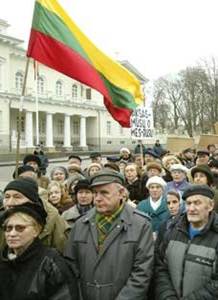
Lithuanian growth slows down
Spreading economic weaknesses in the euro zone and emerging downside risks coming from Russia – the key export markets – point to gradual slowdown in Lithuania’s economic momentum in 2013, especially in the second half of the year. Delayed capital investments and not responsive private consumption will not compensate the deceleration in export markets. Prolonged winter season did not allow for revival in construction, which still stays in red. However, we expect construction sector to bounce in 2013, finally adding to economic growth.
Assessment: We expect Lithuania’s economic momentum to slow down further to annualized 2 percent in 2013 on the back of adverse external environment and higher base. Notwithstanding the slowdown next year Lithuania’s together with Estonia are forecast to restore their pre-crisis level in value added in real terms.
Read more...
- Bookmark :
- Digg
- del.icio.us
- Stumbleupon
- Redit it
- Posted by - (0) Comment

NEWS RELEASE
Member States of EU lose billions in unpaid taxes from
counterfeit and smuggled goods
April 26, 2013
Vilnius, Lithuania — The European Union and Member States lose billions in unpaid taxes every year from counterfeit and smuggled goods. Senior-level tax policy, tax administration and customs officials as well as academics, experts from Eastern European and other countries in a two-day conference in Vilnius address a range of issues involving the shadow economy. The International Conference on the Shadow Economy and Taxation is jointly organized by the International Tax and Investment Center (ITIC) and the Lithuanian Free Market Institute (LFMI).
“In every area of the world where strong price differentials exist between jurisdictions – largely driven by taxation – contraband can be encouraged. The European Union and Member States lose approximately €10 billion in unpaid taxes every year from counterfeit and smuggled tobacco products only”, says Daniel Witt, President of ITIC.
The Eastern European countries or the “new” European Union members, such as Bulgaria, Cyprus, the Czech Republic, Latvia, Lithuania and Poland have higher shadow economies than the “old” European Union countries, like Austria, Belgium, Germany, Italy, observes Prof. Friedrich Schneider (Austria), speaker of the conference.
“This conference is a unique opportunity not only to share good practice in tackling shadow economy, but to expand thinking on how to reduce the illicit activities as well, what is very important for Lithuania and the whole region. It is a good platform to develop proposals how cross government and international cooperation, public-private initiatives can strengthen the forces fighting the shadow economy in order to benefit economic development”, says Žilvinas Šilėnas, President of LFMI.
The conference brings together revenue and customs authorities and policy makers from the EU Member States, World Customs Organization, Interpol, Europol, renowned academics, private sector and industry experts. Among speakers Antanas Šipavičius (Lithuanian Customs), Elizabeth Allen (ITIC), Prof. Louise Shelley (George Mason University), Carlo van Heuckelom (Europol), Dr. Nerijus Mačiulis (Swedbank), Simone Di Meo (Interpol), Vytautas Žukauskas (LFMI), Katarzyna Banaszek (World Customs Organization) and other.
“Smuggling is not just a matter of border security. It is tightly related to the burden of excise tax, general economic situation in the country, public attitudes. Therefore, the most effective ways to combat shadow economy are ones which are directed towards reducing incentive to operate in the shadow economy”, claim Vytautas Žukauskas, LFMI senior expert.
Various researches show, when excise tax levels become excessive, consumers willingly purchase cheaper illicit products to save money. Recent study of LFMI on public attitude towards smuggling and consumption of illegal goods (for fuel, alcohol products and cigarettes) in three Baltic States showed that citizens see large price differences between the Baltic and non EU neighboring states as one of the main reasons determining smuggling, as mentioned by 50% of Latvians, 55% of Estonians and 46% of Lithuanians. 84% of Latvians, 83% of Lithuanians and 76% of Estonians say that the most effect measure to combat smuggling is to reduce taxes (excise).
Prof. Louise Shelly observes that developing countries are the main source of most counterfeits. “Many governments are reluctant to crackdown seriously on counterfeit production because of the economic dislocations it would cause. Therefore, inadequate regulatory and law enforcement resources are allocated at the source, and the products get harder to trace after they depart from the point of production. In most parts of the world, counterfeit products, including cigarettes, are sought by many consumers. Complicating the problems of detection is that in the developing world, the counterfeit goods often travel with legitimate commodities, thereby reducing risk and maximizing the utility of existing distribution networks.”, claims Prof. L. Shelley.
Elizabeth Allen, ITIC Program Manager, highlights the need for a comprehensive cross national government approach tackling supply and demand. “Criminals will take advantage of weaknesses in legislation and controls and quickly adapt their methods to overcome any new obstacles put in their way. Remember, they don’t have to comply with legislation, departmental rules or financial constraints”, says E. Allen.
The conference is being jointly organized by the International Tax and Investment Center (ITIC) and the Lithuanian Free Market Institute (LFMI). It aims to focus on the nature, extent and implications of the shadow economy and illicit trade for the region and to expand thinking on how to reduce the illicit activities. ITIC is a nonprofit research and education foundation, has worked on tax policy and administration issues throughout Eurasia since its founding in 1993. LFMI is a private non-profit non-partisan organization established in 1990 to promote the ideas of individual freedom and responsibility, free market, and limited government.
Visit www.iticnet.org
Visit www.freema.org
MEDIA CONTACT:
Vidmante Sirgedaite, Communication Officer
Lithuanian Free Market Institute
3A Šeimyniškių St., LT-09312 Vilnius, Lithuania
Tel. 00370-5-250-0281,
Mobile: 00370-653-70777
E-mail: Vidmante@lrinka.lt
- Bookmark :
- Digg
- del.icio.us
- Stumbleupon
- Redit it
- Posted by - (0) Comment
How can Lithuania
learn from Iceland?

Lithuanian President Dalia Grybauskaitė with the
Ambassador of Iceland, Elin Flygenring.
The Icelandic government failed to convince its own citizens in the elections this weekend, and the conservative opposition claimed poll win as voters returned parties that ruled over 2008 financial collapse back to power.
But the present Icelandic government has, nevertheless, something important to teach the eurozone, according to an Icelandic economics professor.
While droves of businesses have had to close its doors in Euro cities like Rome and Athens, the business community in Reykjavik avoided mass death. But it could have gone differently, says economics professor Thórólfur Matthíasson at the University of Iceland.
He has called the crisis that hit Iceland in 2008, the perfect storm. A financial sector ten times larger than Iceland's GDP collapsed. The Icelandic krona lost over half the value. Inflation rose far and fast.
Up to 90 percent of Icelandic companies were in danger of getting bankrupt, but many of them could point to future, long term opportunities. The solution Iceland chose, and Matthíasson participated in, was to facilitate the corporate debts.
Both government, banks and individuals went into talks about impairment. The result was win-win, says Matthíasson.
Banks got customers who could handle their debts. Businesses avoided extensive closures. Icelanders avoided unemployment and social deprivation.
- The banks could have pushed for bankruptcy in many companies, but have instead really done their very best to look for common sense in the matter, says the economics professor.
- Bookmark :
- Digg
- del.icio.us
- Stumbleupon
- Redit it
- Posted by - (2) Comment
How can Lithuania
learn from Iceland?
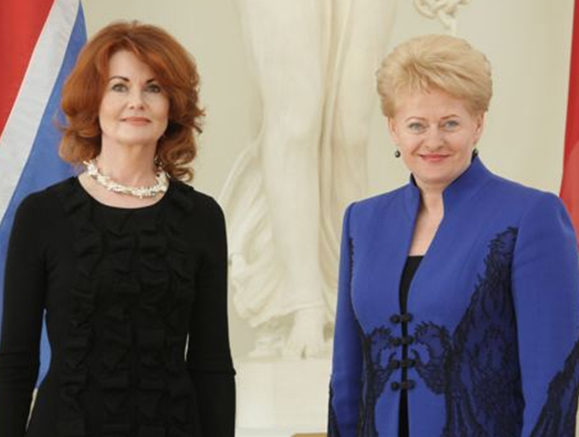
Lithuanian President Dalia Grybauskaitė with the Ambassador of Iceland, Elin Flygenring.
The Icelandic government failed to convince its own citizens in the elections this weekend, and the conservative opposition claimed poll win as voters returned parties that ruled over 2008 financial collapse back to power.
But the present Icelandic government has, nevertheless, something important to teach the eurozone, according to an Icelandic economics professor.
While droves of businesses have had to close its doors in Euro cities like Rome and Athens, the business community in Reykjavik avoided mass death. But it could have gone differently, says economics professor Thórólfur Matthíasson at the University of Iceland.
He has called the crisis that hit Iceland in 2008, the perfect storm. A financial sector ten times larger than Iceland's GDP collapsed. The Icelandic krona lost over half the value. Inflation rose far and fast.
Up to 90 percent of Icelandic companies were in danger of getting bankrupt, but many of them could point to future, long term opportunities. The solution Iceland chose, and Matthíasson participated in, was to facilitate the corporate debts.
Both government, banks and individuals went into talks about impairment. The result was win-win, says Matthíasson.
Banks got customers who could handle their debts. Businesses avoided extensive closures. Icelanders avoided unemployment and social deprivation.
- The banks could have pushed for bankruptcy in many companies, but have instead really done their very best to look for common sense in the matter, says the economics professor.
- Firms are left with the maximum debt burden they can bear, but without getting any gift of money from the banks, he maintains.
Something similar was done for a number of individuals and families who were in danger of bankruptcy, often with debts of 110 percent of the value of their properties written down.
- It has helped those who bought when house prices were at their highest, says Matthíasson.
- In this way we avoided that a bad situation became even worse. It is the Icelandic way, he says and believes many European governments and creditors would do well to study this direction of choice.
But there are still many families who are struggling under a heavy debt burden, and Icelanders are tired of the harsh emergency. Saturday voters punished governing parties in everything choice.
While several European countries still are struggling with recession, Iceland is again growing. Matthíasson is optimistic on the economy's behalf.
- We work a lot more than the average Norwegians and Danes, but by working more, we have managed to keep up the standard of living. And we should not forget that unemployment is at 4-5 percent, which is far below what is the case elsewhere, says the economics professor.
- The conditions are there, the question is whether we have the sense to do the right thing out of it, he says and thinks bad management could cost much.
Iceland, five years after the crisis continue strict capital controls, which puts severe limitations on industry opportunities abroad.
There is no normalization in sight as long as capital controls are there. And there's no good plan for how it will be removed, according Matthíasson and think it's going to stay like that for years.
- If we do not enter currency cooperation with others, it will take us a very long time. All in all, this will be a project of 20 to 30 years. We may not have as strict capital controls at the end of the period, but the first ten years certainly, he says.
- Bookmark :
- Digg
- del.icio.us
- Stumbleupon
- Redit it
- Posted by - (7) Comment
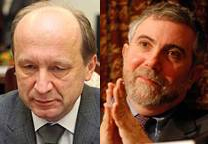
The economic argument is over -
Paul Krugman won
Lithuania’s former prime minister, Andrius Kubilius (left) is a staunch austerity advocate - for those who want to cut spending to reduce deficits and "restore confidence."
"Stimulus" spending, Paul Krugman (right) argues, would help reduce unemployment and prop up economic growth until the private sector heals itself and begins to spend again.
Read more...
To read comments to this article, go to:
For opinions and discussions
- Bookmark :
- Digg
- del.icio.us
- Stumbleupon
- Redit it
- Posted by - (0) Comment
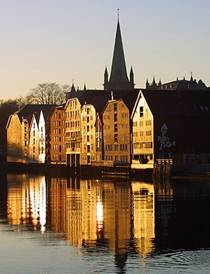
Trondheim is Norway’s technology capital, with exceptionally strong Viking era roots.
Wizz Air opens two new routes from Vilnius –
to Trondheim and Ålesund in Norway
Low-cost airline Wizz Air is celebrating the 2 year anniversary of its base at Vilnius. Wizz Air's Lithuanian base opened on 16th of April of 2011 and has since grown significantly, Reported LETA / ELTA the airline.
Currently, there are 2 Vilnius based aircraft with 22 local pilots and 40 local cabin crewmembers that operate on 14 routes flying 2:08 countries including the United Kingdom, France, Italy, Spain, Germany, Denmark, Norway and Ukraine.
"During our two years of operations in the Lithuanian capital as a local base, Wizz Air has carried over 800,000 passengers and the staffing of the base with Lithuanian professionals was also good news for the local job market. Wizz Air is Continuously opening new Lithuanian low fare routes. Recently we announced two new services Alesund and Trondheim starting in early June as well as the route connecting Vilnius with Kiev that will start operating from early July, and we look forward to further grow in Lithuania, "said Corporate Communications Manager at Wizz Air Daniel de Carvalho.
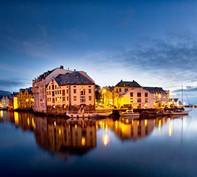
Ålesund is Norway’s
Jugend Style capital.
- Bookmark :
- Digg
- del.icio.us
- Stumbleupon
- Redit it
- Posted by - (0) Comment
The economic argument is over -
Paul Krugman has won
For the past five years, a fierce war of words and policies has been fought in America and other economically challenged countries around the world.
On one side were economists and politicians who wanted to increase government spending to offset weakness in the private sector. This "stimulus" spending, economists like Paul Krugman argued, would help reduce unemployment and prop up economic growth until the private sector healed itself and began to spend again.
On the other side were economists and politicians who wanted to cut spending to reduce deficits and "restore confidence."
Government stimulus, these folks argued, would only increase debt loads, which were already alarmingly high. If governments did not cut spending, countries would soon cross a deadly debt-to-GDP threshold, after which economic growth would be permanently impaired. The countries would also be beset by hyper-inflation, as bond investors suddenly freaked out and demanded higher interest rates. Once government spending was cut, this theory went, deficits would shrink and "confidence" would return.
This debate has not just been academic.
Those in favor of economic stimulus won a brief victory in the depths of the financial crisis, with countries like the U.S. implementing stimulus packages. But the so-called "Austerians" fought back. And in the past several years, government policies in Europe and the U.S. have been shaped by the belief that governments had to cut spending or risk collapsing under the weight of staggering debts.
Over the course of this debate, evidence has gradually piled up that, however well-intentioned they might be, the "Austerians" were wrong. Japan, for example, has continued to increase its debt-to-GDP ratio well beyond the supposed collapse threshold, and its interest rates have remained stubbornly low. More notably, in Europe, countries that embraced (or were forced to adopt) austerity, like the U.K. and Greece, have endured multiple recessions (and, in the case of Greece, a depression). Moreover, because smaller economies produced less tax revenue, the countries' deficits also remained strikingly high.
So the empirical evidence increasingly favored the Nobel-prize winning Paul Krugman and the other economists and politicians arguing that governments could continue to spend aggressively until economic health was restored.
- Bookmark :
- Digg
- del.icio.us
- Stumbleupon
- Redit it
- Posted by - (0) Comment

The land I
lead you to is
Lithuania
SMALL IS THIS LAND,
But great is its truths. To be. To survive. To testify by itself to the abundance and variety of the world’s nations, to the value of man’s life in freedom in his homeland.
PAINFUL IS THIS LAND,
Each blade of grass here sprouts from a drop of blood or a tear.
Read more...
__________________________

Gail VanWart
Beautiful!
__________________________

Randy Jackson
My future country. Understanding the people and their history is something I'm working on. Thanks for this poem.
- Bookmark :
- Digg
- del.icio.us
- Stumbleupon
- Redit it
VilNews e-magazine is published in Vilnius, Lithuania. Editor-in-Chief: Mr. Aage Myhre. Inquires to the editors: editor@VilNews.com.
Code of Ethics: See Section 2 – about VilNews. VilNews is not responsible for content on external links/web pages.
HOW TO ADVERTISE IN VILNEWS.
All content is copyrighted © 2011. UAB ‘VilNews’.

 Click on the buttons to open and read each of VilNews' 18 sub-sections
Click on the buttons to open and read each of VilNews' 18 sub-sections 








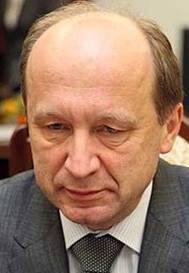










.jpg)



